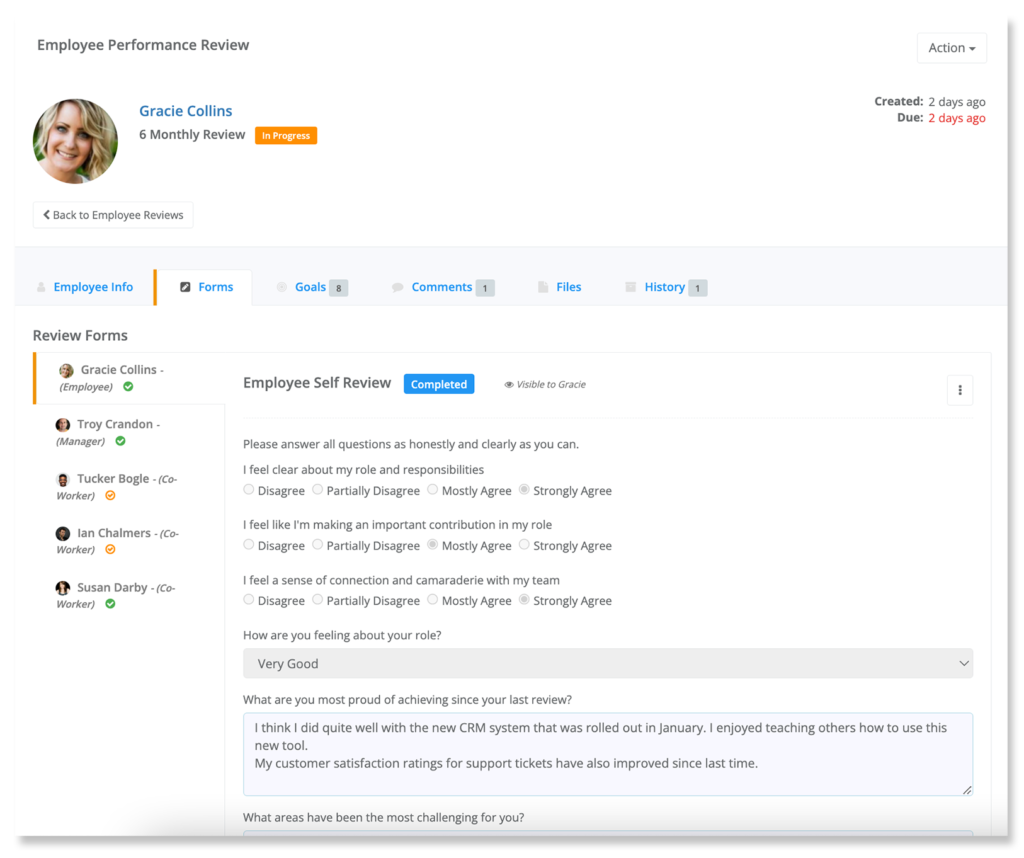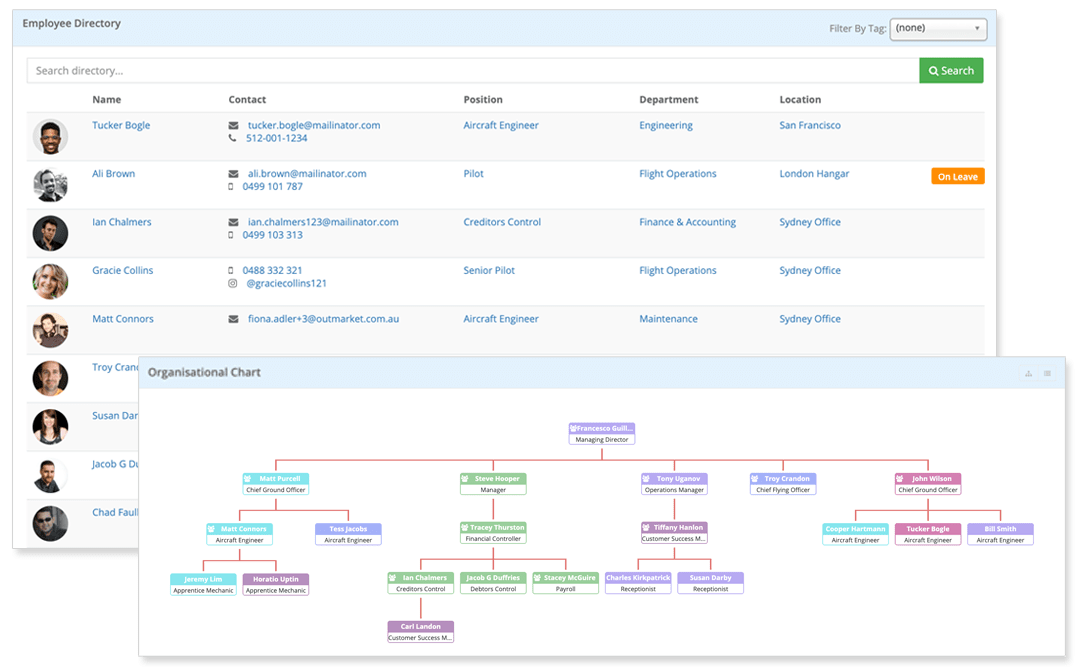You might spend a large portion of your time thinking about your employees, but do they even know you care? As most successful business operators know, the real game-changers behind successful companies, are the people. The old playbook of merely meeting basic employee needs is outdated and the modern workforce demands flexibility, inclusivity, and a genuine emphasis on well-being. In other words, employees need to know you care!
To ensure a business’s competitive edge, human resources (HR) professionals must ensure teams feel valued and cared for, so they can do their best work and allow the company to thrive. But how exactly do you show your employees that they are vital parts of the organization? Let’s explore three simple ways to show your team they’re truly valued.
1. Recognize Employees with Easy Performance Reviews
Holding regular and valuable performance reviews is a great start to helping your employees grow. Although you might think that employees would prefer to skip their review, the reality is that a lack of review process can indicate a lack of commitment and care towards employees. After all, performance reviews aren’t just about ticking boxes; they are opportunities to foster development, align goals, and strengthen relationships. Consider implementing the following practices:
- Regular and Consistent Feedback
Don’t wait for annual reviews; create a continuous feedback loop, enabling real-time adjustments and improvements. This goes for employees too – if your employer isn’t implementing regular reviews, implement them yourself and make time on the calendar. - Two-Way Communication
Encourage employees to share their perspectives, ensuring that reviews are not just a top-down process but a collaborative effort to drive everyone’s career growth and thrive together. - Objective Assessments
Use clear metrics and guidelines to ensure fairness, eliminating biases. These should be discussed at the beginning of the year to set your team up for success. Objectives and goals can always (and should always) be regularly tracked, updated, and refined throughout the year.

2. Celebrate Employee Milestones
Recognizing and celebrating milestones, whether birthdays, work anniversaries, or significant achievements, sends a strong message that you value your employees as individuals. Here’s how to make these celebrations meaningful:
- Acknowledge Individuality
Personalize celebrations to reflect what’s meaningful to each employee. Make birthdays, work anniversaries, or project completions shine with individualized messages and rewards. - Create a Culture of Recognition
Foster a community where peers celebrate each other, enhancing camaraderie. Make sure to implement a system where employees can easily praise each other for good work, enhancing the sense of team unity and shared success. - Invest in Meaningful Rewards
From personalized gifts to extra time off, ensure that rewards resonate with employees’ preferences and values. Tangible rewards still hold a special place. Track and manage these tokens of appreciation, ensuring that your gratitude doesn’t just get spoken; it gets shown.
A tool like HR Partner makes it easy to keep on top of milestones like employee birthdays and anniversaries.

3. Invest in an HR System for Your People
Just as financial systems are critical for managing a company’s monetary resources, a robust HR system is essential for managing your employees. Imagine having a centralized hub that can handle everything from recruitment and onboarding to employee development and well-being – Your business might thrive!
Here’s what you can do when you have an organized HR management system:
- Personalize Employee Experiences
Tailor programs or benefits to meet individual needs, showing that you recognize and value their uniqueness. What could this look like? Here are a few examples:- Customized Learning and Development: Not everyone learns the same way. Some might prefer online courses, while others thrive in hands-on workshops or in-person conferences. By offering a variety of training formats and pathways, employees can choose what suits them best.
- Flexible Work Arrangements: Recognize that employees have different needs due to personal commitments, family dynamics, or preferred work patterns. Offering options like remote work or flexible hours can cater to these individual preferences.
- Personalized Benefits: Allow employees to pick and choose from a range of benefits that suit their individual needs. For instance, younger employees might prioritize student loan assistance, while older ones might focus more on retirement planning or healthcare options.
- Streamline Processes
Cut through administrative burdens, allowing more time for meaningful human interactions and employee growth.Do you have an open role within the company? You may be looking externally when your perfect candidate is sitting right next to you. By having a robust HR system for your employees, you can easily see their previous skills and experience that may make them perfect for an open position. By having employee profiles that include their ambitions, strengths, interests, and past experience, they can pave their own career path within the company. And this saves you time and money on a lengthy recruitment process! It’s a win-win for everyone.With HR management platforms like HR Partner, you can easily see employee profiles to track their growth, see their skills beyond their current role, and so much more. Maybe you recruit externally? The Applicant Tracking System within HR Partner makes recruiting efficient by using email templates, defined stages, and the ability to add the successful applicant as a new employee. - Provide Transparency and Open Communication
Transparency in the workplace means being open, honest, and straightforward about company operations, decisions, and communications. When employers are transparent, employees tend to trust them more, which can lead to increased morale, engagement, and retention.Having an HR management system for your employees can help with open communication. You can better ensure that messages and announcements from leadership are reaching everyone in the company. Additionally, you can promote open dialogue across teams and departments to share news and updates to ensure everyone is aligned and informed on what’s going on throughout the company.

Most importantly, the message that having an HR system sends to employees is powerful! It shows that you value your team members at least as much as other parts of the business where you have proper systems in place.
…….
To build a thriving, engaged workforce, the right tools and practices are key. By investing in an HR system like HR Partner, holding meaningful performance reviews, and celebrating milestones, you’re showing employees that you see and value them as individuals. In turn, this commitment to their success and well-being can translate into a more engaged, loyal, and productive team.
Creating a workplace where employees feel cared for is not a fleeting trend; it’s a business imperative. Start these practices today, and watch how they transform not only your employees’ experience but your organization’s success as well.

Amanda Rivera
HR Knowledge Navigator

